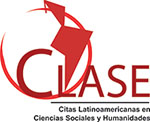Task-Based Learning Approach to enhance oral production in university settings
DOI:
https://doi.org/10.23857/dc.v6i2.1184Palabras clave:
Aprendizaje, enfoque, habilidad, hablar, motivación, reto, tratamiento.Resumen
El presente trabajo investigativo tuvo como objetivo principal el determinar el impacto del enfoque de aprendizaje basado en tareas ayuda a mejorar la habilidad de hablar de los estudiantes del Primer nivel del Centro de Idiomas de la Universidad Nacional de Chimborazo. Para determinar la efectividad de este enfoque, se aplicó un pre-test y un post-test de producción oral el cual estó basado en el examen de Cambridge KET, a los estudiantes Primer nivel de los paralelos 1K4 y 1E4 del Centro de Idiomas de la Universidad Nacional de Chimborazo durante el período Octubre 2018 – Marzo 2019. Se diseñó una guía para el docente la cual fue utilizada durante el tratamiento dentro del aula. Los anólisis de datos se realizaron antes y después del trabajo en el aula. El diseño de la guía para el docente se realizó en base a las tres etapas del proceso de una tarea: pre-tarea, tarea misma y post-tarea con la utilización de varios tipos de tareas tales como individuales, grupales, abiertas, cerradas, y de información, tomando en cuenta la motivación y el reto que cada tarea implica en el mejoramiento de la producción oral de los estudiantes. Después de concluir el tratamiento con la implementación de la propuesta, se procedió al procesamiento de los datos obtenidos del pre-test y el post-test mediante la prueba matemótica T de Student. Los resultados demuestran que efectivamente el enfoque de aprendizaje basado en tareas tuvo un impacto positivo en el desarrollo de la producción oral de los estudiantes quienes mejoraron su habilidad para hablar. Por lo tanto, se recomienda que los docentes apliquen esta propuesta con el enfoque de aprendizaje basado en tareas para mejorar el desenvolvimiento oral de los estudiantes.
Citas
Barrel, J. (1999). Aprendizaje basado en Problemas. Un enfoque investigativo. Editorial Manantial. Buenos Aires
Basir, A. (2010). Developing students’ vocabulary power on past form through tales.
Bernal, C. (2010). Metodología de la Investigación. Pearson. Bogotá.
Belias, D., Sdrolias, L., Kakkos, N., Koutiva, M., & Koustelios, A. (2013). Traditional Teaching Methods vs.Teaching Through The Application Ofinformation And Communication Technologies In The Accounting Field: Quo Vadis? Retrieved from European Scientific Journal : https://eujournal.org/index.php/esj/article/viewFile/1885/1827
Brown, R.;Waring, R., &Donkaewbua, S. (2008). Incidental vocabulary acquisition from reading, reading-while-listening, and listening to stories. Reading in a foreign language.
British Council. (2015). English in Ecuador. Retrieved from https://ei.britishcouncil.org/sites/default/files/latin-america-research/English%20in%20Ecuador.pdf
Byrnes, H. (1984). The Role of Listening Comprehension: A theoretical base. Foreign language annuals.
Calvert, M. &Sheen, Y. (2015) Task-based language learning and teaching: An action-research study. Language Teaching Research 2015, Vol. 19(2) 226–244.
CEFR. (2001). Common Eurpean Framework of Reference. Retrieved April 18, 2018, from Council of Europe: https://www.coe.int/t/dg4/linguistic/source/framework_en.pdf
Chen, Z., &Goh, C. (2011). Teaching oral English in higher education: Challenges to EFL teachers. Teaching in Higher Education, 333-345.
http://dx.doi.org/10.1080/13562517.2010.546527
Crystal, D. (2003). English as a Global Language. New York: Cambridge University Press.
Crystal, D. (2008). Dictionary of Linguistics and Phonetics. Malden: Blackwell Publishing.
Ellis, R. (2003) Task-based language learning and teaching. Oxford: OUP.
Elvillo, M. (2003) Teaching-learning process. Retrieved from:
https://es.scribd.com/document/151677361/Teaching-Learning-Process-pdf
Fareed, M., Ashraf, A., & Bilal, M. (2016). ESL Learners' Writing Skills: Problems, Factors and Suggestions. Research Gate, 81-92. Retrieved from ESL Learners' Writing Skills: Problems, Factors and Suggestions.
Feyten, C.M. (1991). The Power of Listening Ability: An Overlooked Dimension in Language Acquisition. The Modern Language Journal 75:173-80.
Gonzales, P., Ochoa, C., Castillo, L., Cabrera, P., Quiñonez, A., Solano, L., . . . Ulehlova, E. (2015). EFL Teaching in the Amazon Region of Ecuador: A Focus on Activities and Resources for Teaching Listening and Speaking Skills . Retrieved from https://files.eric.ed.gov/fulltext/EJ1075454.pdf
Hadaway, N.; Vardell, S. & Young, T. (2002) Literature-Based Instruction with English Language Learners, K-12. Allyn & Bacon. New York
Haidara, Y. (2016). Psychological Factor Affecting English Speaking Performance for the English Learners in Indonesia. Retrieved from Universal Journal of Educational Research: http://www.hrpub.org/download/20160630/UJER1-19505210.pdf
Hassan, A. (2018). Functions of language. Retrieved from http://qu.edu.iq/repository/wp-content/uploads/2001.pdf
Hí©bert, L. (2018). Funcions of the Language. Retrieved from http://www.signosemio.com/jakobson/functions-of-language.asp
Hymes, D. (n.d.). Dell H. Hymes Personal Web Page. Retrieved 16 January 2018, from
http://www.virginia.edu/anthropology/dhymes.html.
Kartal, G.&Simsek, H. (2017). The Effects of Audiobooks on EFL Students’ Listening Comprehension. The Reading Matrix: An International Online Journal, 17(1).
Krashen, S. (1987) Principles and Practice in Second Language Acquisition. Prentice-Hall International.
Ladjali, D. M. (2015). The Importance of Using Audio Books in Enhancing EFL Students listening Skill (Doctoral dissertation, Biskra University).
Latin American Economic Outlook . (2017). Yourth, Skills, and Entrepreneurship. Retrieved from https://www.oecd.org/dev/americas/Overview_LEO2017.pdf
Leong, L.-M., & Ahmadi, S. (2016). An Analysis of Factors Influencing Learners’ English Speaking Skill. Retrieved from International Journal of Research in English Education: http://ijreeonline.com/article-1-38-en.pdf
Littlewood, W. (2007). Communicative and task-based language teaching in East Asian classrooms. Language teaching,243-249.
McHugh, E. (2016). Latin America's English proficiency ‘very low’. Retrieved from The Santiango Times: http://en.mercopress.com/2013/11/13/latin-america-s-english-proficiency-very-low
Messier, W. (2005). Traditional Teaching Strategies versus Cooperative Teaching Strategies: Which Can Improve Achievement Scores in Chinese Middle Schools? . Retrieved from US-China Education Review,ISSN1548-6613,USA: https://pdfs.semanticscholar.org/72db/b2b98d0fa6d14a6713e188e42b9682875743.pdf
Miles, M. B., &Huberman, A. M. (1984). Qualitative data analysis. Beverly Hills.
Moore, J., & Cahill, M. Audiobooks: Legitimate Reading†Material for Adolescents.
Nunan, D. (2006). Task-based language teaching in the Asia context: Defining 'task'. Asian EFL Journal, 8 (3),12-18. Retrieved from http://asian-efl- journal.com/Feb_06_dn.php
Peña, M. &Onatra, A. (2009) Promoting Oral Production through the Task-Based Learning Approach: A Study in a Public Secondary School in ColombiaVol. 11, No. 2, 2009. ISSN 1657-0790. Bogotá, Colombia. Pages 11-26.
Quezada, P., Benítez, C., Vargas, A., & Zíºñiga, A. (2017). Factors that Influence the English Language Teaching-Learning Process in Ecuadorian High Schools in the context of E- education and E-Society. Retrieved from https://www.researchgate.net/publication/309511514_Factors_that_Influence_the_English_Language_Teaching-Learning_Process_in_Ecuadorian_High_Schools_in_the_context_of_E-_education_and_E-Society
Tudball, L. (2017). New report offers recommendations to enhance English proficiency in Latin America. Retrieved from Pearson: https://www.english.com/blog/english-proficiency-in-latin-america/
Hí©bert, L. (2018). Funcions of the Language. Retrieved from http://www.signosemio.com/jakobson/functions-of-language.asp
Samuda, V. 2001 Guiding relationships between form and meaning during task performanceâ€. In Bygate, M. Skehan, P. and Swain, M. (eds). 2001. 119-140.
Sanchez, A. (2004). The Task-based Approach in Language Teaching. International Journal of English Studies, vol. 4(1), 39-71. doi: Universidad de Murcia.
Simsek, A. (2011). Instructional design. Ankara, Turkey: Nobel Academic Publications.
Swain, M. (2000) The output hypothesis and beyond: mediating acquisition through collaborative dialogue. In J. P. Lantolf (ed.), Sociocultural theory and second language learning (pp. 97–114). New York: Oxford University Press
Swain, M., &Lapkin, S. (1995). Problems in Output and the Cognitive Processes They Generate: A Step towards Second Language Learning. Applied Linguistics, 16, 371-391.
Swary, D. (2014). A Study of Students’ Problems in Learning Speaking English at the Second Grade of Smp Negeri 1 Talaga. Retrieved from https://core.ac.uk/download/pdf/147421764.pdf
Vromen, A. (2010). Debating Methods: Rediscovering Qualitative Approaches. In Marsh, P. & Stoker, G. (Eds.), Theory and Methods in Political Science (p. 249 – 266). China: Palgrave MacMillan.
Wade, R. (1994). Teacher education students’ views on class discussion: implications for fostering critical thinking. Teaching and Teacher Education. Vol. 10(2): 231-243.
Willis, J. (1996). A framework for task-based learning. Harlow: Longman.
Willis, J. & Willis, D. 1996 Challenge and Change in language teaching. London: Heineman.
Wilson, J. (s.f.). How to teach listening . Pearson Logman .
Wolfson, G. (2008). Using audiobooks to meet the needs of adolescent readers. American Secondary Education, 105-114
Yahya, M., & Hashim, N. (2013). Difficulties and Ways to enhance English Writing Skills Among Postgraduate ESL Students. 6th International Conference of Education, Research and Innovation (pp. 6245-6252). Sevilla: Digital Library.
Zacharias, N. T. (2011). Qualitative research methods for second language education: A course book. Cambridge Scholars Publishing.
Publicado
Cómo citar
Número
Sección
Licencia
Authors retain copyright and guarantee the Journal the right to be the first publication of the work. These are covered by a Creative Commons (CC BY-NC-ND 4.0) license that allows others to share the work with an acknowledgment of the work authorship and the initial publication in this journal.







